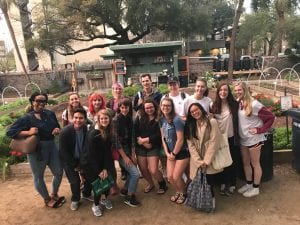This semester I’m participating in the Office of Sustainability’s Urban Garden Apprenticeship program. We care for the various urban gardens planted here at the College of Charleston, and learn about the history, techniques and culture of urban gardening and agriculture. As one of our many field site visits, we toured MUSC’s Urban Farm (https://web.musc.edu/resources/health-and-wellness/ohp/urban-farm). While I could talk about this space endlessly, there are a few relevant details that I want to focus on.
The MUSC space is not only beautiful- aesthetically, it is neat, clean, organized, and even smells wonderful from the many flowers planted throughout the space- but it is extremely functional and diverse in its technical trials. The series of raised beds sit in a half-acre space which was previously a parking lot. While it is a public space, which offers the numerous benefits that green urban spaces and gardens in particular offer (like reducing depression, see NPR’s “Replacing Vacant Lots With Green Spaces Can Ease Depression In Urban Communities”) the farm received a great deal of backlash for removing parking. This speaks loudly to the value system of institutions in regards to public well-being. Parking in downtown Charleston has become a more talked-about problem than ever, and taking up space for that need becomes a hot and fast point of contention. But, as we were told by our tour guide, Carmen, being a medical university, MUSC recognized the multifaceted health benefits of having an urban farm on campus. Not only are there mighty psychological and emotional benefits, the prospect of having locally grown, sustainably sourced food on campus is unrivaled (not to mention MUSC is by all technicalities within a food desert: the closest grocery store is well over one mile away). MUSC and the farm staff have utilized this huge asset by encouraging healthy eating and experimental culinary practices. The farm, thus educates not only about food systems, agriculture and farming itself, but about healthful living through food and nutritional awareness. Because of these initiatives, they sparked student interest that has resulted in expanding the crop varieties of the farm. MUSC has a very diverse student population, and by request, produce from different parts of the world are grown in the garden to reflect that diversity. So, not only is the garden serving its purpose as an emotional support, an air purifier, a supplier of food, and an educational venue, it is also acting as a cultural melting pot and incubator.
While the victory of the garden’s existence is a feat (should it be called a Victory Garden…?) the space’s history as a parking lot has dictated the use of the land in important ways. Because the land itself is covered in asphalt and largely poisoned by the emissions of the cars which have driven upon it, the growing spaces must be self-contained. The beds, as a result, are built about 10 inches high and all the soil fit for plant life is protected and above ground. Irrigation systems are in place in each bed, two of which utilize an interesting and innovative method: wicking. In short, a wicking bed will store water in a drainage pipe at its base beneath the soil, and through osmosis water will naturally ‘wick’ up to the roots of plants as it’s needed. This system is excellent here Charleston, where our excessive rainfall can be captured and utilized. One of the benefits of having many separate beds is that different methods of irrigation, planting, and using natural pesticides and insecticides can be tried without extreme adverse effects to the whole crop or to the Earth’s soil. Farms like these then, borne from environmentally detrimental beginnings, can have innovation and progress at their ends. In a wider view, biologically and chemically this entire space is being upcycled. Once an asphalt lot devoid of life, it is now a thriving, biodiverse farm. While its origin confines it, the farm also can speak to improvements in urban planning and living.

